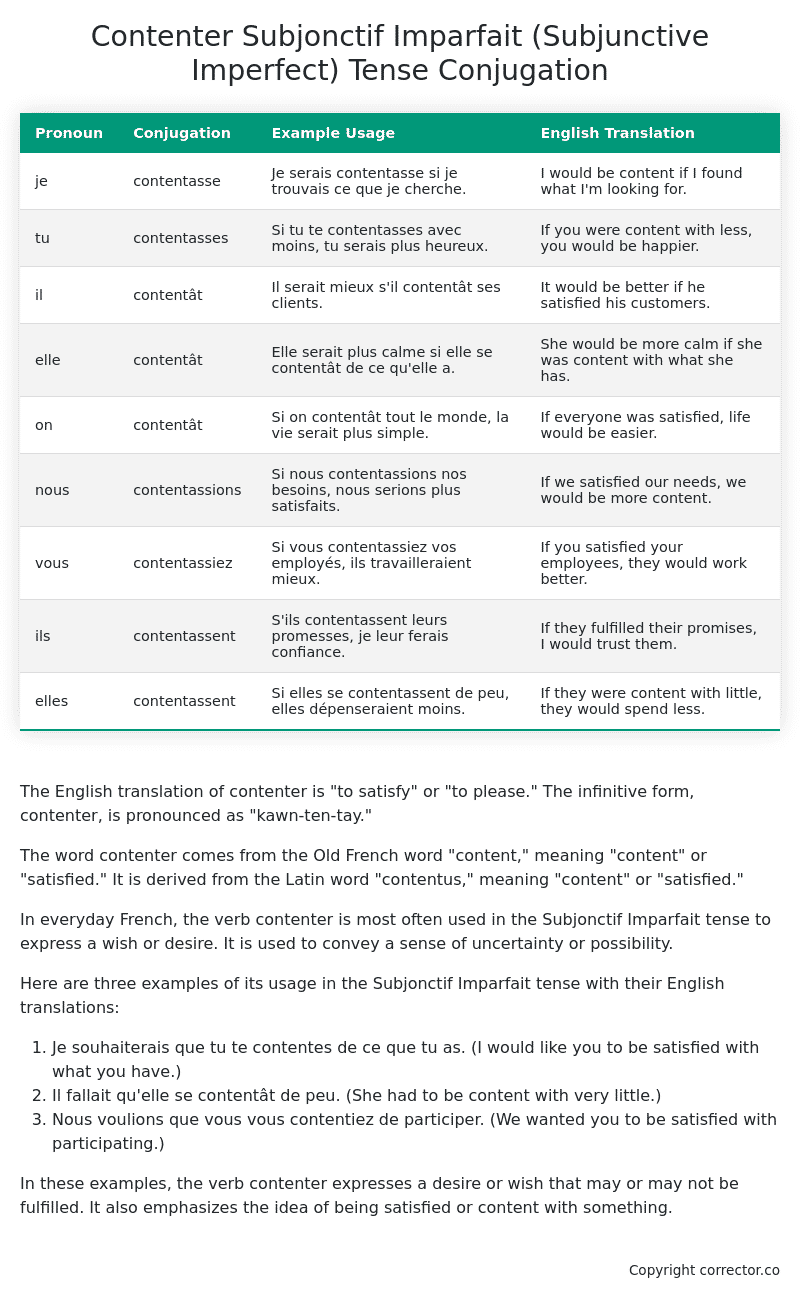Subjonctif Imparfait (Subjunctive Imperfect) Tense Conjugation of the French Verb contenter
Introduction to the verb contenter
The English translation of contenter is “to satisfy” or “to please.” The infinitive form, contenter, is pronounced as “kawn-ten-tay.”
The word contenter comes from the Old French word “content,” meaning “content” or “satisfied.” It is derived from the Latin word “contentus,” meaning “content” or “satisfied.”
In everyday French, the verb contenter is most often used in the Subjonctif Imparfait tense to express a wish or desire. It is used to convey a sense of uncertainty or possibility.
Here are three examples of its usage in the Subjonctif Imparfait tense with their English translations:
- Je souhaiterais que tu te contentes de ce que tu as. (I would like you to be satisfied with what you have.)
- Il fallait qu’elle se contentât de peu. (She had to be content with very little.)
- Nous voulions que vous vous contentiez de participer. (We wanted you to be satisfied with participating.)
In these examples, the verb contenter expresses a desire or wish that may or may not be fulfilled. It also emphasizes the idea of being satisfied or content with something.
Table of the Subjonctif Imparfait (Subjunctive Imperfect) Tense Conjugation of contenter
| Pronoun | Conjugation | Example Usage | English Translation |
|---|---|---|---|
| je | contentasse | Je serais contentasse si je trouvais ce que je cherche. | I would be content if I found what I’m looking for. |
| tu | contentasses | Si tu te contentasses avec moins, tu serais plus heureux. | If you were content with less, you would be happier. |
| il | contentât | Il serait mieux s’il contentât ses clients. | It would be better if he satisfied his customers. |
| elle | contentât | Elle serait plus calme si elle se contentât de ce qu’elle a. | She would be more calm if she was content with what she has. |
| on | contentât | Si on contentât tout le monde, la vie serait plus simple. | If everyone was satisfied, life would be easier. |
| nous | contentassions | Si nous contentassions nos besoins, nous serions plus satisfaits. | If we satisfied our needs, we would be more content. |
| vous | contentassiez | Si vous contentassiez vos employés, ils travailleraient mieux. | If you satisfied your employees, they would work better. |
| ils | contentassent | S’ils contentassent leurs promesses, je leur ferais confiance. | If they fulfilled their promises, I would trust them. |
| elles | contentassent | Si elles se contentassent de peu, elles dépenseraient moins. | If they were content with little, they would spend less. |
Other Conjugations for Contenter.
Le Present (Present Tense) Conjugation of the French Verb contenter
Imparfait (Imperfect) Tense Conjugation of the French Verb contenter
Passé Simple (Simple Past) Tense Conjugation of the French Verb contenter
Passé Composé (Present Perfect) Tense Conjugation of the French Verb contenter
Futur Simple (Simple Future) Tense Conjugation of the French Verb contenter
Futur Proche (Near Future) Tense Conjugation of the French Verb contenter
Plus-que-parfait (Pluperfect) Tense Conjugation of the French Verb contenter
Passé Antérieur (Past Anterior) Tense Conjugation of the French Verb contenter
Futur Antérieur (Future Anterior) Tense Conjugation of the French Verb contenter
Subjonctif Présent (Subjunctive Present) Tense Conjugation of the French Verb contenter
Subjonctif Passé (Subjunctive Past) Tense Conjugation of the French Verb contenter
Subjonctif Imparfait (Subjunctive Imperfect) Tense Conjugation of the French Verb contenter (this article)
Subjonctif Plus-que-parfait (Subjunctive Pluperfect) Tense Conjugation of the French Verb contenter
Conditionnel Présent (Conditional Present) Tense Conjugation of the French Verb contenter
Conditionnel Passé (Conditional Past) Tense Conjugation of the French Verb contenter
L’impératif Présent (Imperative Present) Tense Conjugation of the French Verb contenter
L’infinitif Présent (Infinitive Present) Tense Conjugation of the French Verb contenter
Struggling with French verbs or the language in general? Why not use our free French Grammar Checker – no registration required!
Get a FREE Download Study Sheet of this Conjugation 🔥
Simply right click the image below, click “save image” and get your free reference for the contenter Subjonctif Imparfait tense conjugation!

Contenter – About the French Subjonctif Imparfait (Subjunctive Imperfect) Tense
Formation
Common Everyday Usage Patterns
Interactions with Other Tenses
Subjonctif Présent
Indicatif Passé Composé
Conditional
Conditional Perfect
Summary
I hope you enjoyed this article on the verb contenter. Still in a learning mood? Check out another TOTALLY random French verb conjugation!


